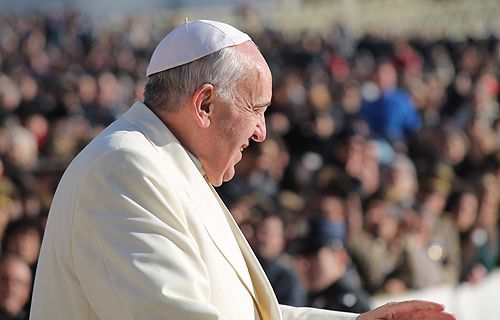Pope Francis received a letter Wednesday from the president of the Spanish region of Castile and Leon, Juan Vicente Herrera, inviting him to visit Spain to mark the 500th anniversary of the birth of St. Teresa of Avila. The invitation was delivered Feb. 26 to the Holy Father during an audience held with a delegation from the Foundation for the Commemoration of the 500th Centenary of St. Teresa of Jesus, the government of Castile and Leon, and the city of Avila. The Holy Father was also presented with the pastoral, cultural, and scientific program for the event. The delegation included Bishop Jesus Garcia Burillo of Avila; Jose Martinez Gonzalez, vicar general of the Discalced Carmelite Order; Alicia Garcia, culture and tourism adviser of Castile and Leon; and Miguel Garcia Nieto, mayor of Avila. According to EFE news agency, the delegation met with the Father General of the Carmelite Order in Rome, Friar Saverio Cannistra, and with Spain's ambassador to the Holy See, Eduardo Guitierrez Saenz de Buruaga. The foundation hopes Pope Francis will travel to Avila in 2015 to preside at the closing ceremony of the centenary, which is being officially celebrated by the Spanish government. Castile and Leon, where Avila is located, will play a key role in the celebrations, as the region where St. Teresa was born and died, and where she founded 17 convents. St. Teresa was born in Avila March 28, 1515, and was largely responsible for the reform of the Carmelite Order, along with St. John of the Cross. “Teresa of Jesus had no academic education but always set great store by the teachings of theologians, men of letters and spiritual teachers,” Benedict XVI said of her during his Feb. 2, 2011, General Audience. “As a writer, she always adhered to what she had lived personally through or had seen in the experience of others, in other words basing herself on her own first-hand knowledge.” “Teresa had the opportunity to build up relations of spiritual friendship with many Saints and with St John of the Cross in particular. At the same time she nourished herself by reading the Fathers of the Church, St Jerome, St Gregory the Great and St Augustine.” “It is far from easy to sum up in a few words Teresa’s profound and articulate spirituality,” he continued. “In the first place St Teresa proposes the evangelical virtues as the basis of all Christian and human life and in particular, detachment from possessions, that is, evangelical poverty, and this concerns all of us; love for one another as an essential element of community and social life; humility as love for the truth; determination as a fruit of Christian daring; theological hope, which she describes as the thirst for living water.” “Secondly, St Teresa proposes a profound harmony with the great biblical figures and eager listening to the word of God. She feels above all closely in tune with the Bride in the Song of Songs and with the Apostle Paul, as well as with Christ in the Passion and with Jesus in the Eucharist. The Saint then stresses how essential prayer is. Praying, she says, 'means being on terms of friendship with God frequently conversing in secret with him who, we know, loves us.'”

